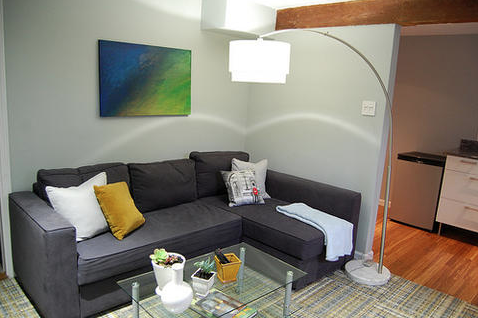City nails down legislation for short-term rental market
Although legislation has finally been passed in Nelson to manage the previously unregulated short-term rental market, it remains to be seen how many of the supposed 140 such accommodation providers will now comply with the bylaw without specific enforcement.
On Monday night the city passed final reading and adoption of the bylaws to regulate and administer to an industry that has been operating under municipal radar for a number of years without business licences.
After a public meeting on Monday, Dec. 5 (6 p.m.) in city council chambers to hear final arguments for or against the legislation concerning short-term rentals in Nelson, city council moved into its regular meeting in which final reading and adoption of four bylaws — Business Licence Bylaw, Off-Street Parking and Landscaping, Official Community Plan and Zoning— relevant to short-term rentals were passed without incident.
The city elected to go without specific enforcement based on a city staff recommendation, noting Nelson was in a position to achieve a higher compliance rate than other cities have achieved by introducing “dynamic” regulations and a realistic enforcement strategy.
City staff research found aspects of the community and the tourism industry had cautioned against outright prohibition of short-term rentals in Nelson. It was also believed enforcement of a prohibition would consume too many municipal resources. A negative impact on tourism, particularly in the summer, would be a possible consequence.
The drafting of short-term rental market legislation has been an industry-led process, said Stephen Harris of the Nelson Short-Term Rental Owner Association. If the industry had sat back the easy default position for the city would have been to pass a bylaw to ban it and hope for the best.
It was Harris who made the recommendation for the $800 per year licence fee that was recommended in the draft legislation, as well as cautioning against creating a dedicated enforcement officer for short-term rentals.
“The city does not need to have an enforcement officer, who costs a lot of money, to shake that money out of me,” said Harris. “I’m willing to pay that. And all of my colleagues want to pay that.”
The Nelson Short-Term Rental Owner Association was formed in the summer in response to the city’s consultation around short-term rentals. The recommendations that city staff drew up were close to what the association wanted to see in place.
Last summer the city employed a researcher in development services for the sole purpose of examining the gap between city policies and the short-term rental (STR) market.
With an estimated 120 listings in the short-term realm — and up to 40 of them quite active — the majority of them were considered illegal by virtue of the fact they lacked a business licence and were not in compliance with zoning.
The city stance was it was not necessary to shut down the market, even though many people did not want short-term rentals. City staff recommendations for legislation had found ways to mitigate those negative concerns and create a level playing field for all accommodators in Nelson.
When approved, the proposed amendments should establish a regulatory and licensing framework for the purpose of creating a level playing field for accommodation providers in the city, as well as minimize potential conflicts between the accommodation providers, neighbours and the city.
The new regulations will be in place for the 2017 business licencing cycle.
Key regulations
Some of the regulations for the STR market in Nelson include:
- STRs would be allowed almost everywhere, however city-wide caps and a density cap are proposed in residential areas, in light of general support for this through public consultation (this is intended to maintain the integrity of residential neighbourhoods. Any property owner is free to apply to rezone to commercial, if that is their intention for the property). A density cap would help ease on-street parking competition without requiring new off-street parking to be built at great cost to resident-operators and Nelson’s natural capital;
- Distinguish between rooms for rent (such as a conventional bed and breakfast) and entire dwelling units;
- A new business licence category of up to $800 for a year-round, entire-dwelling unit rental;
- The availability of monthly and summer-only licences to facilitate occasional home sharing and to enable landlords of student housing to create needed summer tourist accommodation supply;
- Year-round licence-holders to contribute to funding tourism marketing;
- Fire safety inspections and a one-time proof-of-insurance requirement;
- Allow for the short-term rental of multifamily building units for the first time, provided that the property owner/manager or strata council has no objection;
- A principal residency requirement, supported by public consultations; applicants must demonstrate that the property is their principal residence. A new zone is proposed to allow for the possibility of a non-resident property owner to rezone a secondary residence for STR purposes. Nelson already requires potential B&Bs outside of commercial areas to rezone if they wish to have more than two guest rooms;
- Initial priority to existing STRs and bed and breakfast’s, but licencing requirements will still be obligatory.
- A process to revoke a licence in the case of a problematic STR.
- An online, publicly-accessible directory of all licenced short-term rentals and their 24/7 contact.

























